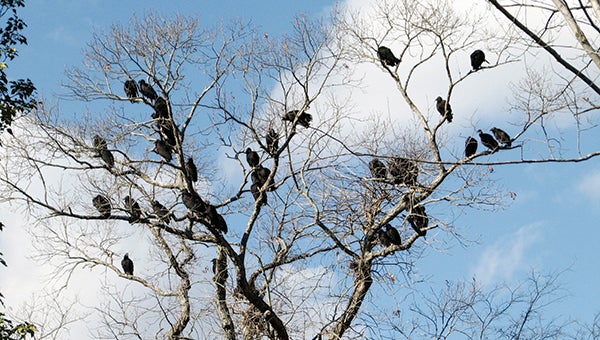In the vultures’ wake
Published 7:39 pm Saturday, February 13, 2016

A wake of vultures roosts in the branches of a tree near the Chuckatuck home of Catherine Jones. Jones says the size of the group has exploded during the past year.
Catherine Jones has lived in her Chuckatuck-area home for 54 years and has never seen anything like it.
It started with two of them, which she was startled to look out her window and see relaxing on her picnic table one day about eight or nine months ago.
Then there were a few of them, circling her home and resting in a nearby tree.
Then, as these problems have a way of doing, they multiplied.
“My husband has to wash down the driveway three times a week,” Jones says, looking with disdain at the scores of black vultures congregating on several nearby trees about 3 p.m. on a recent afternoon. More are circling overhead, looking for a place to land.
“That’s their favorite tree,” Jones says. As she speaks, a feather drifts off of one of the birds and floats to a patch of grass all the way on the other side of the road.
“They say they won’t attack you, but if there’s enough of them, I think they will,” Jones said.
Jones hasn’t been able to get any peace since the birds began multiplying and using the trees near Hawk Lane as a resting area in the morning and afternoon. They walk around on her roof in the morning, causing a racket. Her dog is afraid to go outside and do his business unless Jones is with him.
“They said if I kill any of them, I’ll go to jail,” Jones said.
Black vultures — and, in fact, all migratory birds with the exception of a few species not native to the country — are protected under the U.S. Migratory Bird Treaty Act, according to Dr. Scott Barras, state director of the Virginia Program of the USDA Wildlife Services.
Farmers can apply for a permit to shoot birds harassing their livestock through the U.S. Fish and Wildlife Service, but it’s a fairly involved process, Barras said.
Although black vultures typically feed on the carcasses of dead animals, they can also prey on calves and piglets, Barras said. Sometimes they actually manage to take the youngsters; sometimes, they injure them so badly they have to be euthanized.
“This is not a new situation,” Barras said. “This is something that happens throughout Virginia.”
One state senator has taken the issue by the claw and proposed a bill, Senate Bill 37, which would authorize the Virginia Department of Game and Inland Fisheries to make agreements with government agencies and with farmers and other people to control the black vulture population.
Sen. Bill Carrico, R-Grayson, told Capital News Service he was asked by farmers to submit the legislation.
The bill has passed the Senate and been recommended for reporting by a House committee.
Barras said the birds do provide a service in nature.
“There are a lot of scavengers on the landscape, and that’s an incredibly important role in the ecosystem,” he said. “Consuming animal carcasses and contributing to nutrient cycling in the food chain is an important role in the ecosystem that assists decomposition.”
Jones isn’t convinced the birds play an important role in her life. She wants them gone from her neighborhood and has reached out to several local and state officials asking for help.
She said they suggested things ranging from banging trash can lids together — which her husband tried to no avail — to telling her to go find the nest.
“Ain’t that what he’s getting paid for?” she said of the officials.
Barras had one particularly macabre suggestion he said is quite effective.
“Vultures in particular are sensitive to the sight of another dead vulture,” Barras said, acknowledging it’s a humorous attribute for a creature that eats other species’ dead for a living. “It really affects their behavior.”
He suggested getting an artificial vulture — a Halloween decoration or one specifically made as a deterrent — or, if one is lucky enough, finding a carcass of one and hanging it in effigy.
“It sort of helps keep them moving,” Barras said.
He also recommended that neighbors band together to keep the birds away.
“It’s really not going to help if you focus your efforts on a single house or a single property,” he said. “They’ll just move around the neighborhood. Make sure they just don’t get any peace, that you’re constantly putting pressure on them to move away.”
He also recommended cleaning up trash, shooing feral cat colonies and taking other measures to ensure there’s no food waiting around for them to eat.
“Unless the birds are nesting, it’s perfectly legal to harass or disperse these birds,” Barras said. There are all sorts of devices on the market, from pyrotechnics to motion-activated water sprinklers, that also can help keep the birds at bay.
Jones just hopes the sinister-looking creatures leave soon.
“I have tried everything,” she said. “We’re getting sick of it.”





